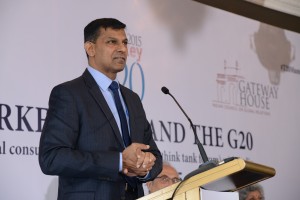“Global Economy and Challenges for Multilateral Policies”
The agenda for the T20 is a vast one, so I have to pick and choose. I am going to focus today more on economic issues and leave aside the humanitarian, political and other issues.
I’m going to argue that world growth hasn’t picked up ever since the crisis. And in the G20 meetings recently as well as the IMF meetings in Lima, there’s now talk of this – first the sub-prime crisis, then there was the European crisis, and now this talk of an emerging market crisis, or potential emerging market crisis.
And I’m going to argue these aren’t three different crises, they are the same crisis happening in different ways. But the reason that this crisis is moving on from country to country, or region to region, is something that we have to be very worried about.
And there, there is scope for global action. It’s difficult, but it may be necessary, if we have to get out of this regime of rolling crises – which I would argue didn’t start with the global financial crisis, it actually started before, in the 1990’s, with the emerging market crisis then.
Broadly speaking in the economic sphere we need broad new rules of the game, as well as a reform of the multilateral institutions to enforce them.
Is this going to happen in a hurry? No. That reflects some of the deficiencies in the multilateral discussion. But it’s time to start talking and I would argue that some of the problems in global economic management are problems that you can see in the management of some of the other issues that were put on the table, and there are some similarities.
So with that as a description of what I’m going to talk about, let me jump into it. We’ve had fairly slow industrial country growth for the last seven years, since 2008. And there are various arguments for why this is the case. Of course the first argument is we had a very deep crisis. Typically you emerge from crises quite fast – recoveries from recessions are typically V-shaped. But we haven’t had much of a recovery, let alone a V-shaped recovery.
One argument is, this is because of the nature of the crisis. A lot of debt taken on – debt overhangs on corporations, on households make it very hard for them to borrow. Of course, most recently, governments have taken on debt – partly shifting debt from the corporations and households to their own balance sheets. Governments are also reaching the limits of their debt. So, one argument is – it’s debt.

One possible answer is, grow slower – don’t grow so fast, and accept that sustainable growth- if you’re not willing to do the structural reforms – is actually going to be at a lower rate.
And we need the deleveraging, and the deleveraging is taking more time and therefore, one shouldn’t be too impatient. Of course, we did try to stimulate economies – the 2008 summit and subsequent summits were well known for the G20 urging countries to spend if they could. A number of countries took up the challenge of spending and there were massive fiscal stimulus packages, including in our own country where we had three sequential stimulus packages.
These haven’t done the trick – they haven’t quite restored growth, including in our own country. There are arguments resurfacing today that the specifics of stimulus matter – we should build infrastructure. And infrastructure is long-lasting, high returns, especially in times when construction material and construction costs are low, because industries are under employed – so let’s build infrastructure. This was the mantra in industrial countries.
However infrastructure investment took off only in a few countries and where it has taken off, it hasn’t had much positive effect. Japan, for example. Massive infrastructure investments over the last couple of decades, but it still is not out of the woods. And part of the problem is, in many industrial countries, finding worthwhile infrastructure to build is hard. There’s a lot of infrastructure already out there. Yes, everybody can see the potholes outside their window which needs fixing. Everybody can see a bridge or two that needs fixing. But beyond that the large infrastructure projects, that would really move the needle on growth, are both harder to find, harder to coordinate on and harder to execute.
And I think that the difficulties in implementation of infrastructure in industrial countries aren’t realised enough. In our own country of course, we have massive infrastructure needs, and we’re trying to go about them. But infrastructure in industrial countries is more difficult. So as people have found, that stimulus, whether monetary or fiscal, doesn’t seem to be restoring growth. And even deleveraging – there’s been a fair amount of deleveraging in the United States, some in Europe – even deleveraging doesn’t seem to have restored growth, they’ve turned to the next possible reason why it hasn’t happened. And that’s because structurally there were problems in the industrial countries which limited growth and we need to fix those structural problems.
Now what could be the structural problems? Most recently, a number of arguments that the nature of populations in industrial countries, ageing populations, have a different set of demands, a different set of supply possibilities and unless we cater to them specifically we are going to see growth slow down as we have seen in Japan. That’s one set of arguments.
Another set of arguments pertaining to what we heard just before I came on, was on income inequality. Perhaps the movement of incomes towards higher income people has in fact reduced overall demand. After all, poor people consume every rupee that they receive, but rich people – once you’ve bought your yacht and your private jet, there’s not that much more you can spend on. And so the marginal propensity to consume out of incremental income is lower. That’s the technical way of saying you don’t have much to spend on when you’re really rich. And so as a result, what you see perhaps is demand falling off.
So one argument is that we’ve had demand falling off for quite some time in industrial countries. It was boosted temporarily by the heavy debt that they took on pre crisis, but post crisis with the high debt, it slowed down considerably. And so, we need to find ways of boosting demand, but it may be that it takes structural change, including, some people argue, shifting incomes from the richer to the poorer people. There have been arguments made along these lines.
Another set of arguments are about supply. The real problem is not demand, it’s that we haven’t had productivity growth in industrial countries, of the kind that would warrant sustained growth. And the fairly low productivity growth means that there can’t be enough supply even if you generate the demand. And of course these two feed on each other. If you don’t have productivity growth and you’re unlikely to grow at a strong pace and create jobs, then people are more circumspect about spending and demand falls off. And similarly corporations, if they don’t see productivity grow, if they don’t see high profitability, are not going to invest so much – demand falls off. So supply constraints, or supply worries create a demand constraint, and similarly if firms don’t see enough demand, they don’t actually invest. So these things are highly interrelated, you can’t sort of separate one from the other.

That’s what I meant by the crisis shifting from place to place. That we have in a sense, a global game of musical crisis and we have to worry about where this ends.
But the bottom line is that we need structural reforms. For example, if part of the problem is the elderly are going to move out of the workforce, and therefore there are going to be supply constraints in the future, we need to find a way to get people who are not ordinarily participating in the labour force to come in. Which means, that in countries like Japan, there’s an argument that we should make it easier for women to come in to the labour force – which means structural reforms on making it easier for women to work. And you could argue that in Europe, the biggest constraint to growth is the low productivity in the service industry because of limited competition. The classic example is of the cartelized taxi industry and why don’t we open it up. And organisations like Uber and so on are fighting to do that. But whether in fact there should be reforms which allow that to happen in a more serious way.
The problem with structural reforms as a pathway to growth is classically summarised by Jean Claude Junker who said – he was former Prime Minister of Luxembourg- “We all know what to do, we just don’t know how to get reelected after we’ve done it.” So the problem with structural reforms is, they have the wrong timing of gain and pain. Politically what you want to do is something that has a lot of gain upfront and the pain is down the line, because somebody else takes the blame for that. But what happens is, with structural reforms, the pain is upfront, because you are actually hitting the interests who benefit from the cozy system: the taxi drivers who have a cartelized system, by letting entrants in. The gain comes to the new entrants down the line, but they realize it only down the line after the reforms are done. And so the voters are going to compensate you five years from now, but then you’re history by that time because the current taxi drivers have voted you out.
So the problem with structural reforms is, it’s always fun to tell somebody else to do it, especially other countries, but doing it in your own country is difficult. What we have is a real difficulty in generating growth. And it’s a difficulty which is not just post financial crisis, but I think pre-financial crisis, which in fact explains why we took on so much debt across the world pre-financial crisis, in an attempt to pump up growth, which just wasn’t happening.
One possible answer is, grow slower – don’t grow so fast, and accept that sustainable growth– if you’re not willing to do the structural reforms – is actually going to be at a lower rate. The problem is that it’s very hard for governments to accept lower growth in the industrial world because the promises they made in times of high growth are coming back to roost. Entitlements in the 1960s on healthcare, on social security – certainly in the United States at the current trajectory – are un-payable. You cannot deliver on those promises, they are too big. But even since then, what has happened is, you have made more and more promises, often to public sector workers.
In the state that I know well because it’s been a long time teaching at Chicago – Illinois, has made enormous promises to its public sector workers, because it was always convenient. Harder to increase current wages because it will increase your budget, but convenient to increase pensions, because somebody else pays for it down the line, while you get the credit. And so enormous pension promises, which simply cannot be delivered. So you have all these entitlements coming, and then you have debt – debt taken on during the financial crisis, taken on before the financial crisis.
When you have all this, the only way to pay it is to grow. Growth is an imperative in many industrial countries. But it’s not just growth for the sake of growth, it’s the distribution of growth. That when you have a slowdown, the worst hit are the newcomers, the young. Because especially in societies which are more insider societies, the insiders are reasonably well protected, but it’s the outsiders – the young, the immigrants who get hit. And they can start raising their voice – the high levels of youth unemployent in Europe are a serious source of concern. But now immigrant unemployment is contributing to that.
And of course, we talked about inequality. That’s also an issue which has come to the forefront and it’s not something to be dismissed lightly. It’s one of the biggest forces governing political debate in industrial countries today. The fact that middle class jobs are being lost – lost to technology, lost to global competition – means that a very strong constituency for stability is getting weaker and weaker. And again for the middle class, given that good middle class jobs are fairly small in number, you need growth to even create those additional jobs. So growth is absolutely an imperative.
And perhaps last, but more to the mind of central bankers – deflation. There is a very strong fear, especially in the United States, given its historical experience in the 30s, that if deflation takes hold, you will have a Japan-like experience, and have to write off 15-20 years of growth. Now I think that’s a misreading of what happened in Japan, but nevertheless, there is a very strong fear amongst the central banking community across the world, that deflation has to be averted at any cost. And therefore that’s another reason to try and promote growth because if you have reasonable growth, you can avoid the deflation problem.
So, bottom line, to perhaps summarise quickly is – growth has been low, perhaps for decades we have masked it with a fair amount of debt and the current emerging market slowdown is just a reflection of the slowdown in industrial countries. If you think about the growth model that took off in the 1990s in the emerging markets – it was exporting to the industrial countries. And as the industrial countries slowed down, for a while the emerging markets concealed that slowdown with packages of their own – the massive debt financed growth for example in China. But once they realised that the industrial country growth was going to be slow for a much longer time, the emerging markets also stepped down.

In fact when I was co-chair of that working group we actually wrote a few and it turned out that it makes a big difference who has the pen. Because what you write is very different – and actually we did the first piece on spillovers.
What we need in the world is obviously all these structural reforms that we are all reluctant to do. And so we are all looking out for someone in the world to step up and grow faster and pull the world along. It used to be the United States that used to be this engine of growth, then perhaps some people look to China. But in this environment where nobody is willing to step up, there’s a real question of how to give them a push. How do you push somebody to step up and pull us along?
This is where I think we enter dangerous territory, where the kind of method we give other people to push is through unconventional monetary policy. Including a shared rate intervention, which tends to push capital into other countries. As it pushes capital into other countries, it moves them a little faster for a while. But eventually this capital, where it moves the other country faster, creates difficulties for that country – we’ve seen this three times, and I’ll come to that in a second.
That’s what I meant by the crisis shifting from place to place. That we have in a sense, a global game of musical crisis and we have to worry about where this ends.
Now how do you say this – where do you say this is from? I would say go back to the 1990s. In the early 1990s, interest rates were kept very low in industrial countries as countries including the United States were trying to revive their banks post the emerging market crises of the 1980s. So interest rates were low, capital flowed to the emerging markets. As the industrial countries revived and started raising interest rates, capital started flowing out. You have the Mexican crisis, you had the Asian financial crisis, you had the Argentinian crisis and nearly a Brazillian crisis – all in the span of three or four years, as capital flowed out because monetary policy tightened in industrial countries.
So what the emerging markets said is, never again, we’re not going to be subject to this kind of thing, we’re going to resist capital inflows. So every time capital comes in we are going to build up reserves. We had an enormous build up of reserves in the emerging markets in the early 2000s. And because the capital from the emerging markets was now being pushed back to the industrial countries, some of the industrial countries started running large current account deficits. The U.S. – 6% at its peak, Spain, Greece, Portugal, all these countries. So think about which countries then got affected by crises. It was now the turn of the industrial countries. The U.S., then Spain, Greece, Portugal. And remember in 2005, Chairman Bernanke made his – he was still not Chairman at that point – but he made his famous savings glut speech, where he said the problem for the industrial countries, especially for the US, was this flood of capital of savings coming from the emerging markets and distorting prices in industrial countries, and creating real estate booms etc etc. So he complained about the capital flowing in and said we can’t manage it.
That was a prescient speech and it preceded the U.S. financial crisis.
Now think about what happened post financial crisis. Post financial crisis, the industrial countries slowed down tremendously. No more borrowing from the rest of the world to finance expansion. Fiscal deficits came down. And who now started becoming the next leg of the musical crisis – it was the emerging markets. Massive spending increases, including in India, which attracted a lot of capital, including in China, including in Turkey, including in Brazil. And that hasn’t ended well either, that all of us have slowed down considerably, because we’ve had to manage the macro-economic consequences of absorbing serious amounts of capital. And now again as the prospect of interest rate start rising, starts taking hold, the capital is flowing out, leaving debris in its way.

There is a very strong fear, especially in the United States, given its historical experience in the 30s, that if deflation takes hold, you will have a Japan-like experience, and have to write off 15-20 years of growth.
Can we do this better than this? Where we continuously push capital from one shore to another? Because the next leg of this is again a massive reserve build up in the emerging markets as they try and deal with the consequences of capital flowing in. So I would argue that what we have to worry about are policies that do this. That extreme monetary policies including both the exchange rate intervention that some of the emerging markets indulged in, in the early 2000s, as well as the unconventional monetary policies that the industrial countries have engaged in, had the primary effect of altering your exchange rate and pushing capital, and given that they are essentially creating problems for others, have large negative spillovers without the commensurate positive spillovers domestically. That if you have a policy which increases domestic growth enough and therefore allowed you to act as an engine of world growth, that would be reasonable – that offsets any negative spillover effects that you might have. But if the primary effect is through the exchange rate, depreciating your currency, trying to sell goods to others while pushing capital to them, then in fact you could argue, you’re not playing the appropriate role as global citizen – you’re having more effects outside than inside.
Unfortunately if you look at central banking mandates across the world, no central bank has a mandate for the world. Its mandate is purely domestic – what are you going to do to elevate employment and growth. It has to worry about the world only at a second level. If I do something which creates problems for another country, and as a result demand from that country falls off for my country’s goods, I should take that into account, the feedback effects. But not the feed forward – I don’t care if I destroy that other country completely, so long as it doesn’t import from me. I’m okay, right? That kind of domestic mandate is actually there in every country. This is not pointing fingers at any central bank.
We haven’t got mandates for the world. And as a result monetary policy even in its most aggressive kind – and I want to put an equivalence between unconventional monetary policy and direct exchange rate intervention because sometimes they have the same effect – and I want to argue that we’re in a world where there’s nothing that prevents these kinds of policies. There’s nobody looking at them. The IMF is supposed to look at these things in a global sense. But the IMF has been sitting on the sidelines applauding these kinds of policies right from when they were initiated, and hasn’t really questioned the value of these kinds of policies. Yes, it does spillover studies. But the spillover studies invariably say this is good for their country and therefore good for their world. I think we need to examine these issues again.
So bottom line, can we do better? Yes we can do better. Of course the world needs more investment, and that means in the emerging markets that have the need for infrastructure investment, such as ours, we need to do much more investment. We certainly are prepared to do it, we have large plans, we are beginning to do them – the Delhi-Mumbai Industrial Corridor, the Eastern and the Western freight corridors. Lots of plans and we are embarked on it.
But emerging markets embarking on infrastructure also need support. There is now a view that multilateral institutions don’t need to provide finance, all they need to do is provide advice because the private markets can do the rest. Private markets can do a lot. But private markets are not often the best source of patient risk capital. And sometimes patient risk capital with knowledge is what the multilateral institutions provide. At a time when the world needs infrastructure, shrinking the multilateral institutions is not a great idea. And the fact that there is space here is a reason why we have all these new institutions coming up. Ideally, India has always stood for global engagement, global multilateralism – we want the existing multilateral institutions to be strengthened, not weakened.
From the industrial country perspective, there certainly is scope for investment, but it may not be the typical infrastructure, it may be green infrastructure. We know that the world has to deal with climate change and environmental issues sooner rather than later. Perhaps the onus of the investment to deal with that has to come from the industrial countries, which have a much greater responsibility for the current levels of carbon in the atmosphere. So an emphasis on green in the industrial countries. And of course we have our part to play, the emerging markets, and we will.
But an emphasis on replacing, in the existing stock of investment which is non-green, to investment which is green, is something the industrial countries can do much more of, it’s a clear need, it is something that can be revived at this point. And I think the countries that are emphasising this, such as Germany, Japan, and to some extent the United States, are going down the right path.
We need new rules of the game on policy. And I think we always retreat as central bankers to say we have a domestic mandate. What we need is a political consensus to go beyond domestic mandates to think in this integrated world where monetary policies affect each other, what might be a sensible way of moving forward. I don’t want to pose any easy solutions to this – happy to discuss it in a debate, but it is something that we need to do.
Now even while I say we need a better cohesion, better coordination on at least mandates, I would also say that we have to be very careful in this world, in avoiding financial repression. Let me explain. Even when I say impatient capital flows easily across borders, every country today needs patient capital. In the industrial countries, it’s about financing the long-term pensions that are going to be due in financing the debt of governments. And similarly, in the emerging markets it’s financing long-term infrastructure. One worry is that with the spate of new regulations that are coming up in the financial sector, that it tends to be biased against long-term patient flows in the emerging market because long-term flows have a much higher risk weight, and flows to emerging markets which are lower weight than industrial countries also have a very high risk rate.
So as we are getting stronger and stronger regulations in the financial sector, it may have the effect of chilling the needed flows, even while the less needed flows are encouraged relatively because they’re short term, invested in government security etc. and can be put in at a moment’s notice. So the worry is long-term patient capital should not be repressed by the kinds of global regulations that we’re getting in so that capital which is needed in the emerging markets sit in the industrial countries and doesn’t move, while the un-needed or less-needed capital flows more effectively.
Given that we have these capital flows – and certainly it’s very hard to separate the good from the bad – we probably also need better global safety nets to ensure that those who accept this capital and who use it, have liquidity protection in case the capital wants to run out. Typically the IMF is supposed to do this kind of activity, but unfortunately because of past history, certainly in Asia but to some extent in Latin America, there’s an enormous stigma in going to the IMF, which is why countries in the region are developing regional arrangements rather than going to the multilateral institutions. For example, we have lent a billion and a half dollars to Sri Lanka as part of a swap arrangement we have with them. But better than this would be a stronger multilateral global safety net and we need to work towards making that possible. It would be needed because going directly to the IMF carries enormous stigma and very few countries in Asia are willing to do that.

The fact that middle class jobs are being lost – lost to technology, lost to global competition – means that a very strong constituency for stability is getting weaker and weaker.
Of course the concern amongst a number of countries that would put out the money, is moral hazard. If we make money too easy, lots of countries will do things that are not appropriate, get into trouble and then call for funding. But there has to be a way to balance these two interests and we need to find out a way to make these global safety nets up and running otherwise there will be countries that would be left out and not in any kind of succor when in fact the global financial conditions change.
One proposal that has been put out which deserves examination is central bank swap lines mediated and backed up by the Fund. There are some proposals like this floating but at this point we need political support for something like this because central banks simply don’t have the capability of agreeing to this on their own.
Finally we need better legitimacy for the global multilateral institutions. This is not just about quotas which are held up say for the IMF. This is not just about who appoints the managing director or where the managing director comes from. This is more about having a more inclusive discussion. Which means one, the agendas that are proposed, for what we work on, have to be more inclusive and reflect the interests of the developing countries and emerging markets also. It cannot be just driven by what is important on the industrial country plate. The staff of these institutions typically tend to have a world view which is driven by where the institution is located and where they hire from. Doesn’t matter that they have citizens from all countries – if the citizens have all been to the same kinds of institutions in the industrial world and then live in Washington or Frankfurt or somewhere else, they tend to have a world view which is driven by that location. And that also makes it much harder for them to appreciate what is happening elsewhere. So we need to think about how we deal with that issue also.
But finally I think, and this is where I will come back to the T20, we need more capacity in the emerging markets. I say propose agendas – well the industrial countries will push back and say you can propose an agenda anytime you want. We don’t do it. We don’t do it often because we haven’t thought enough. We haven’t developed our own capacity to provide new ideas to the global financial system. So we’re almost always in reactive mode – “What did they say? Do we like it or do we not?” instead of saying “Here’s what we say”. For the first time with the new institutions that are being proposed, largely by China, we’re starting to put some new alternatives on the table. But we must, across the emerging world, realise that some of the reasons why global governance seems to be sort of against us is we’re not putting enough resources into this.
Let me give you just one example. The G20 framework working group is supposed to be co-chaired by Canada and India. So it’s a fair arrangement, an emerging market with an industrial country. But Canada has seven strong economists working on this group, trying to further the agenda, while India brings far fewer people to the table. Because we don’t have that strength in the number of economists who can actually contribute. Yes, we go to our think tanks etc. but we don’t have people working in government who have that kind of training and that kind of a capacity. And as a result what happens is more of the pen and the writing is done by the Canadians. And they’ve stepped up to the plate – this is a natural consequence.
But it would be far better for us to bring more people to the working group so that we act as equal partners, rather than let them do the writing while we do the commenting. In fact when I was co-chair of that working group we actually wrote a few and it turned out that it makes a big difference who has the pen. Because what you write is very different – and actually we did the first piece on spillovers. In February of 2013, before the taper tantrum, saying this is something we need to start worrying about as industrial country market policies normalise. And it was something that at least shone the spotlight on something we needed to talk about and was very important.
So bottom-line, a lot of demand for growth. The policies that add to global growth could be far better and perhaps there’s a reason to coordinate because countries are indulging more in policies that shift growth from others to themselves rather than create more growth for the global economy. So, while staying away from the protectionism. That’s a benefit of the global economy today. We may have strayed into comparative easing and that’s a concern. We do need to look at globally-optimal policies and for that I think we need to focus on how we improve global institutions. And I think this forum is a very good start.
Thank you.
Raghuram Rajan is the Governor of the Reserve Bank of India.
This speech was delivered at T20 Mumbai 2015.
You can read exclusive content from Gateway House: Indian Council on Global Relations, here.
For interview requests with the author, or for permission to republish, please contact outreach@gatewayhouse.in.
© Copyright 2015 Gateway House: Indian Council on Global Relations. All rights reserved. Any unauthorized copying or reproduction is strictly prohibited


